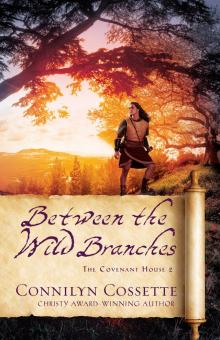- Home
- Connilyn Cossette
Shelter of the Most High Page 16
Shelter of the Most High Read online
Page 16
Amused by her determination and enjoying the opportunity to observe her at my leisure, I leaned back against the wall, placing my elbows on the ledge. She attempted the sling a second time, her face a mask of concentration. Her soft curls floated free on the breeze. I was grateful that she rarely tied her hair back. The few times she’d hidden her locks beneath a headscarf while working out in the courtyard or in the gardens outside the city walls with my mother, I’d felt as though a cloud had moved over the sun.
“Our armies are well known for our companies of slingers,” I said. “The Canaanites came to fear the speed and precision of projectiles that can hit charioteers at a run and even pierce armor. Most of us begin learning as soon as we can walk. It came in handy when I was chasing birds from the vineyards as a boy, although I usually found a large leafy branch to be most effective.”
After a few more tries, Sofea’s confidence in her swing strengthened, and she insisted that she was ready to shoot. I moved to stand directly behind her and placed my arms beneath hers. She startled, whirling around to peer up at me, lips parted in surprise. “What are you doing?”
“Teaching you the timing of the throw.” Emboldened by the fact that she’d not pulled away from my touch, I shifted closer, her nearness sending heat to the soles of my feet. She blinked up at me with those enormous pools of blue. I wanted to dive into them and never surface again, but I willed innocence into my expression. “I cannot simply tell you. I have to show you.”
With one last suspicious glance, she turned around, swept the bulk of her glorious hair over one shoulder, and submitted to my loose embrace. The feel of her slender body in my arms and the smell of her skin was intoxicating, but valiantly clinging to Baz’s admonishments that a solider must be in command of himself at all times, I held her hands between mine, swung the sling around twice, and then demonstrated the correct moment to release one of the cords and let the missile fly.
Without enough speed to propel the stone, it dropped lazily to the ground three paces away, but she still cheered, exclaiming loudly in her own language, her joy at such a small victory flowing into my own blood. In that moment my determination to speak to Darek about arranging a betrothal immediately upon his return became etched in stone. From the way Sofea had responded to me earlier, I had little doubt that she was of the same mind, and I was desperate to secure the promise of her hand.
She twisted her neck around to look up at me but did not pull away. “You need to teach the sling in this way?”
“Perhaps not.” I shrugged, my hands drifting to her waist, my voice dropping. “But I felt this was a much preferable training technique.” I bent forward, letting my mouth graze the curve of her ear. “Don’t you agree?”
“Sofi?” Prezi’s voice floated from the staircase behind us, and I slid away from Sofea just as her cousin came into view, followed by Abra and Chana. Standing two steps down, Prezi looked back and forth between us, no doubt sensing the moment she’d interrupted still hanging in the air.
“Moriyah has need of us,” Prezi said, sending me a glance that somehow communicated equal parts suspicion, protectiveness, and amusement at finding Sofea here with me.
Surprised by the acceptance I sensed in her demeanor, I squelched a smile. “Of course. We can continue our lessons another day.”
My sisters slipped past Prezi on the stairs, and after spying the sling in my hand, begged for their own lesson. They clung to my legs, pleading with such big-eyed fervor that I could do nothing but acquiesce. The sound of their cheering conjured a vision of a future daughter of my own—one with golden brown hair and bottomless blue eyes—wrapping me around her tiny finger. “All right,” I told them. “A few tosses. But then I need to get to the foundry. I have a project that needs finishing.” One that would find its way to its new owner this very night.
Following Prezi, Sofea peered back over her shoulder before she disappeared from sight, a regretful smile on her lips. She wasn’t any more anxious to leave this rooftop than I was to see her go. The wait for Darek to return so I could place the two most important requests of my life before him would seem an eternity.
CHAPTER
TWENTY-TWO
Sofea
Prezi and I approached the spring outside Kedesh where a crowd of women waited to collect fresh water in preparation for Shabbat. Other than brushing aside my concerns about whether she’d be able to carry a full skin-bag while hobbling back into the city on her crutch, she had not said much since she’d found me on the rooftop with Eitan, but her mischievous expression made it clear that she had much to say.
Grateful for the privacy our shared language offered as we awaited our own turn at the spring, I turned to face my cousin, gripping my empty water jar close to my body. “I know you are practically boiling over with questions.”
“Perhaps now is not the time.” Her eyes flitted to the women around us who were watching our conversation, undoubtedly wondering what the two foreign girls were babbling about.
“They can’t understand us, Prez.” I fluttered a hand. “Say what you need to say.”
Her brown eyes danced in amusement. “You were with Eitan.”
I grinned. “I was.”
“And he had his hands on your waist!” Her tone squeaked upward.
“You saw that?”
“I stood on the stairs for a few moments, too stunned to speak.” Her admission was paired with a little shake of her head. “What were you doing?”
Diving into the deep. I could still feel the way his strong arms had surrounded me . . . his breath on my cheek . . . his lips at my ear . . . I restrained a shiver but fixed an innocent smile on my lips. “He was teaching me how to use a sling.”
Her arched brows displayed obvious disbelief. “You are fully aware I won’t accept that paltry explanation,” she said, folding her arms. “The sun, moon, and stars are sparkling in those big blue eyes. Tell me.”
I explained to Prezi about Eitan’s childhood, his ear, and then the vow he’d made not to cut his hair until Moriyah was free, but I kept his part in the boys’ death, and the heavy grief he carried, to myself. The way he’d clung to me as if he were reliving that night all over again had convinced me that no matter how much I trusted Prezi, it was not my story to tell.
“He is very devoted to his God,” she said.
“It seems so.” The passion with which he’d spoken of Yahweh as the Most High God had caused an unsettling lift within my spirit. For all the talk of the gods back in our village, I’d never heard anyone, let alone my father the high priest, speak of a god or goddess who claimed power over every living thing and every part of creation. As if he were not only the most powerful of all the gods, but the only one worthy of worship.
As if she’d heard my internal musings, Prezi said, “This God the Hebrews revere is very different from our gods, Sofi. Moriyah has explained much to me while we work around the inn.”
A twinge of jealousy tugged at me. Prezi had become as much Moriyah’s shadow over the past few months as Abra was to me. She rose before dawn each day to help prepare bread with her and seemed content to spend many hours in the courtyard weaving with Binah and Sarai while I entertained the children, helped clean rooms for the guests, and ventured into the market to purchase goods for the inn for Moriyah, who’d discovered I had a knack for bartering. Every day I did so, I looked for Kitane and her little boy, wondering when they would return to Kedesh. Remembering the last of my words to her, one final plea that she and her husband take us away from this city, I realized that she’d been right to insist we stay.
Although the ache for my island had not disappeared, it had waned significantly over the past months. Eitan’s family had absorbed us into their life with such ease—feeding us, clothing us, affording us time to heal and rest after our arrival, inviting us into their celebrations, and never once had they demanded anything. Our participation in the household had come on gradually, a result of our gratitude for their kindnesses and a natural en
folding of us into their daily rhythms. I could not explain it, but somehow Kedesh had become a place of refuge. A shelter from the storm that had swept Prezi and me from our home and across the sea.
“Has he asked you to marry him?” Prezi’s quiet question blared into my thoughts.
I choked on my reply. “No.”
“Does he intend to?”
The remembrance of our kiss tingled on my lips and heat flashed into my cheeks.
She peered at me, amused and expectant.
“I think he might.” I bit my lip and lowered my voice, even though no one around us could decipher my words. “He certainly kissed me like he did.”
A hand flew to her mouth. “He kissed you?”
I glanced down at my hands gripping the jug—at the finger that had drawn him in, loop by loop. “Actually, I’m fairly certain I was the one who initiated the kiss.”
Pink painted her cheeks as she giggled. “Somehow that does not come as any surprise to me, cousin. I’ve seen the way your eyes follow Eitan everywhere, and you are always the first to volunteer to deliver food and drink to the men at the foundry.” She pinched my arm gently. “Subtlety has never been among your strengths. Your heart is all over your face.”
A trio of chattering women moved away from the edge of the spring, giving us enough room to finally approach the bank. After dipping my hand in for a quick drink of the sparkling clear water, I crouched to tilt my jug beneath the surface, watching it burble to the rim, and then traded Prezi for her empty skin-bag.
“Do you understand what marriage to Eitan would mean?” Prezi asked. “Moriyah has explained many of their laws to me. Among them is that Hebrews may only marry those of their own kind, or those who choose to embrace worship of Yahweh alone and bind themselves in covenant with his people. Are you prepared for that?”
I tied off the waterskin and then helped her sling it across her back before hefting my own pot of water to my hip. “Posedao nearly stole you from me. And the gods that my parents worshipped on that high hill . . .” I swallowed the burn in my throat. “I want nothing of them. I don’t know this Yahweh, but if he commands the sea like Eitan says he does, then perhaps he is more like Posedao than I’d guessed. But if I can have Eitan . . .” I placed my fingers on the lips his had so recently touched. “Then perhaps I don’t need a god. There is no such thing as a god who cares about me, but Eitan does. I can see it in his eyes.”
Prezi remained quiet beside me as we made our way back through the city gates with our burdens. As she’d insisted earlier, she’d become so deft with her crutch that I barely had to slow my pace. Although I knew our discussion about Eitan was far from over, her way was to turn a thing over and over before speaking her mind, so I allowed her time to contemplate as we made our way toward the inn
The city was readying for Shabbat, the market stalls closing down early, women scurrying home with baskets on head and goods in hand. Pack animals were already penned in courtyards, having been relieved of their burdens and untethered from wagons in preparation for their own seventh-day rest. Over the past months I’d become accustomed to the Hebrews’ peculiar weekly tradition, enjoying the peace that settled over Kedesh from sunset to sunset.
Just as we reached the door to the inn, Prezi stopped and turned to me, her mulling apparently at an end. “Eitan cares for you, Sofea. It is evident to anyone within twenty paces of you both. But I think that Yahweh cares for you as well.”
I wrinkled my brow at the strange declaration. “Why would you think that?”
“You are here, are you not? Out of all the people slaughtered in our village, the two of us were spared. Then, against every odd, we survived the sea, were found on a remote beach in a foreign land by Darek and his men, and brought to this place—a city designated as a place of refuge. And now, instead of living beneath the tyranny of your father and his gods, we enjoy weekly sabbath rest among the people who have sheltered us, clothed us, and shown us love in spite of our heritage. It’s almost as if Yahweh plucked us out of the sea himself and carried us to this place.”
The prayer I’d sent skimming across the restless ocean came to mind. Had the Hebrews’ One God been the one to hear my plea that day?
Prezi turned to me, her expression solemn. “I was dead on that beach, Sofea. After seeing what Seno and his men did to my family . . .” Her words shuddered to a stop. “I was so angry at you for not just letting me drown. And when I went to sleep in the sand, I hoped that my eyes would never open again. But somehow, through these people—through their God, through their beautiful ways—I came to life again. In truth, I feel like I was never truly alive before now.”
Perhaps Yahweh had saved us from drowning that day, but I knew that if it was true, it was for Prezi’s sake he’d done so, not for mine. But regardless of the reasons or the means by which we had come here, I was grateful and more than willing to submit to the laws of these people, enjoy their sabbath days, and participate in their festivals as long as I could have Eitan.
CHAPTER
TWENTY-THREE
An old man moved to stand at the center of the gathering next to the fire, all eyes focused on him. Braziers flickered in the corners of the space and along with the fire pit cast wavering shadows on the faces of many people scattered in groups on the ground.
I’d been told that this would be a night of stories, a time to bathe in the histories of these people and their ancestors. I’d experienced many of these gatherings in the past few months, although I did not remember this man being the storyteller. However, in the past I’d not understood enough of the language or hadn’t bothered to pay much attention, too lost in my own thoughts of fear, or survival, or too distracted by Eitan’s handsome face and searching glances from across the courtyard. But after Prezi’s admonition that marriage to Eitan would include covenant with his people, and what she’d told me of the shift in her own heart, my curiosity was piqued like never before.
Hushed and expectant, we waited for the man to speak.
“This land is not where our origins lie,” he said, the authority in his voice echoing off the stone walls of the courtyard. “Our father, Avram, was not born here. Instead he sprang from Ur, a city far from here.” He gestured to the east. “From earliest childhood, he was steeped in the worship of Inanna, of Enki, and Utu, the gods of Sumer, the gods his own father, Terah, fashioned from wood and stone.”
The old man’s silvery beard caught the firelight, giving him an otherworldly glow as his hands gesticulated his words. Next to me on the ground, Prezi leaned forward, lips slightly parted as if thirsty for more of the story.
“But Avram had heard the whispers about Elohim,” the man said. “He remembered the day he’d met Shem, the ancient son of Noach, as a small boy. Although nearly five hundred years old, Shem still lived, and none of the memories of the Great Deluge had withered from his mind. On a night very much like this one, Avram listened to Shem describe how his family alone boarded a mighty ark, withstood the never-ending rains, and listened to the sounds of the condemned as they beat on the walls of the boat as it lifted and then were swallowed by waves that covered the whole face of the earth.”
Although a few details of the story were lost to me, something seemed familiar about it, as if there were echoes of the tale in the stories the Sicani had passed down from generation to generation. A devastating flood. A large boat full of animals. Few survivors. Perhaps our histories were not so different from that of the Hebrews. I found myself mimicking Prezi’s posture, elbows on my knees and my focus narrowing on the elder’s face. His eyes skimmed the crowd, his mouth turned upward as he continued.
“The stories of the Flood clung to Avram, and as he grew he found himself hungering for more knowledge of Elohim, of the One God who’d saved Noach’s family from destruction, and wondering how it was that within the lifetime of Shem, man had already turned to gods of their own creation instead of the One who created man—the God whose immense holiness would slay any who looked upon his
face and whose enormity and perfection cannot, and should not, be depicted by any human hand.”
Images of the gods were as familiar to me as my own reflection in the tide pools. Posedao, Atemito, and all the other gods and goddesses were depicted in amulets, idols, and carvings. Each of our huts had contained an altar with various household gods to ward off evil spirits and provide protection for those within. If such images were not allowed here among the Hebrews, how did they ensure Yahweh would protect them? My mind was a clutter of confusion, and I had the urge to spring up and approach the old man to demand answers for the myriad questions his words provoked.
“Then,” he said, “came the day when Elohim spoke to Avram. Telling him to take himself away from his father’s tents and follow where he led.”
The elder described a journey from the land of Ur here to Canaan, and even how the path had taken a sad detour in Egypt where Avram had made the mistake of calling his wife his sister. He told of the promise Elohim made to Avram, that this land would one day be inherited by his descendants, but that those of his flesh and bone would be held captive in a foreign land before finally being led out of slavery. He told of how his name was changed to Avraham, the father of many nations—a promise to a man without a son.
“And I was there,” said the storyteller, “when that prophecy was fulfilled. Although I was only two years old at the time and have only cloudy flashes of memory of that night, my small feet trod the dry seabed after Yahweh congealed the powerful depths into walls as we escaped the wrath of the Pharaoh. I was there when the great Cloud hovered over us, a fiery shelter of protection to guide us to safety, the first steps on a journey that would take us here, to this land, to this city of refuge and hope. And although the Cloud is no longer visible over us, the Eternal One still watches, still protects, still holds fast to his promises to Avraham. We reside, now and forever, in the shelter of the Most High.”

 Until the Mountains Fall
Until the Mountains Fall Between the Wild Branches
Between the Wild Branches To Dwell among Cedars
To Dwell among Cedars Counted With the Stars
Counted With the Stars Shelter of the Most High
Shelter of the Most High Shadow of the Storm
Shadow of the Storm A Light on the Hill
A Light on the Hill Wings of the Wind
Wings of the Wind